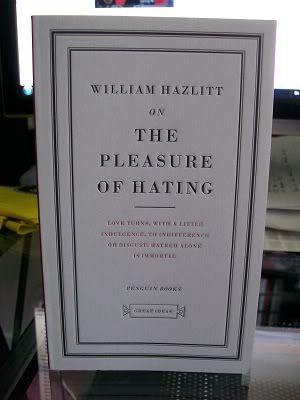
A post like this wouldn't be complete without at least one volume of Penguin's Great Ideas series, so here's a collection of essays by English writer William Hazlitt, titled On The Pleasure Of Hating. This is a nice change from the volumes that came previous int he sense that Hazlitt has a great personal style of writing, and I feel that this volume focuses less on the ideas he is presenting (as opposed to say, Wollstonecraft or Paine) but rather on the distinctive personal style of his writing.
The final essay in the collection, On The Pleasure Of Hating is easily the standout of the half dozen packed into this 120 page paperback. In which Hazlitt comes to the sobering conclusion that love and hate are necessarily connected, in the sense that at one point or another, love will certainly turn against itself. He concludes his thoughts by reflecting on the fact that he is "always disappointed where I placed most reliance; the dupe of friendship, and the fool of love; have I not reason to hate and to despise myself? Indeed I do; and chiefly for not having hated and despised the world enough."
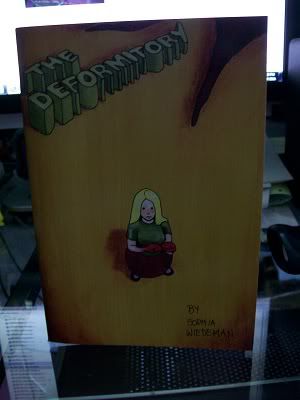
Keeping in the realm of self-loathing, this is a short graphic novel by Sophia Wiedeman titled The Deformitory. Telling the story of Dolores (along with a couple other minor characters) who struggle to establish any sort of interpersonal relationships, and due to the fact that they all share physical deformities they end up residing in a tower on an island after which the book is titled. And I'm not talking one foot smaller than the other sorta deformities, I'm talking lobster hands and mermaids with the lower torso of a slug. Even if you've never woken up to find yourself half-man-half-beast, the general theme is something real easy to relate to assuming you grew up in anything short of an episode of Leave it to Beaver.
Upon reading and further investigation I found out that this book was submitted as Wiedeman's graduate thesis project, and while I'm not exactly on the fast track to getting a MFA, I think it fucking rules that a comic can be considered a valid project. I mean, she has the degree now, so it must count, right?
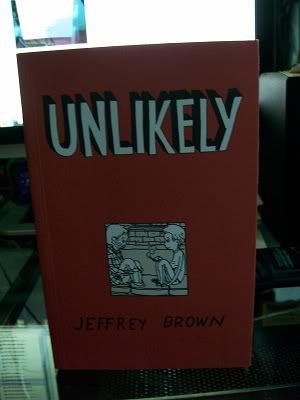
Graphic novel number two is Jeffery Brown's Unlikely, telling the story of how he awkwardly went about losing his virginity and the fallout of breaking up with his girlfriend of that time after the fact. Generally, I shy away from autobiographical books of any sort (comic or not) so I think I surprised myself a little by picking this one up on a whim.
I'm still not entirely sure how I feel about it, it was a good read in the sense of being able to watch Jeff's cycle of success/failure/success/more failure/end through out the relationship and the connection was there but I couldn't and still can't really put my finger on what exactly made it possible for this book to keep my interest enough for me to read it in a single sitting and actually enjoy it. I imagine it's enjoyable because it's a real basic everyman story and manages to capture the unpredictability of life perfectly because well, it was life, at some point.
I'm debating whether or not to pick up any of Brown's other books (this is apparently the second installment of what has been dubbed the "Girlfriend Trilogy". We'll see...
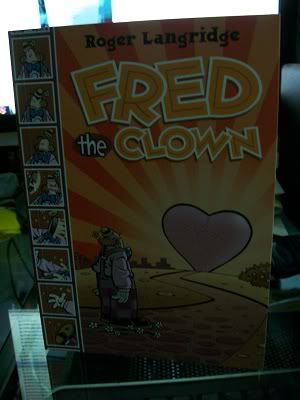
From super realistic to totally unbelievable, here's Roger Langridge's Fred the Clown. With a focus on the entirely absurd, Langridge presents Fred, a clown who is trying as hard as he can to make it through life and find a woman, but just can't keep ahead. In regards to Lapp's Children of the Atom I mentioned reading a review in which he was compared to Samuel Beckett, and in this review I'm going to put forward the idea that Fred the Clown is three quarters Charlie Chaplin, and one quarter Beckett.
Fred has a character much like Homer Simpson (another whom I would give the Chaplin/Beckett comparison), in that he lands in a gray area between reality and the absurd. While most of the time he fits the role of being totally unbelievable, at other times it's entirely possible to look at a situation in which Fred has found himself and see an entirely normal person standing there.
Langridge does an amazing job of writing excellent gag comics, and has a cartooning style that manages to hold not a single main joke in each strip, but often many smaller ones at the same time. A great read for anyone interested in "funny" comics.
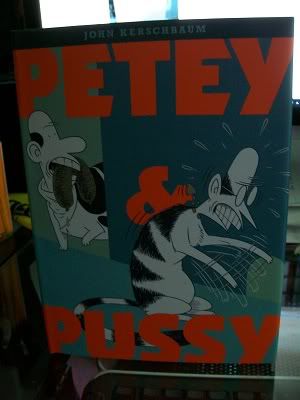
I think I picked up Petey & Pussy because subconsciously the title made me giggle immaturely, or something. On that note, that's about as uproarious as my laughter got when I was reading through this. I'm sorry John Kerschbaum but maybe something about you just isn't "my thing" or whatever, even though I do like his online comics.
Chronicling the misadventures of dog and cat duo Petey and Pussy, Kerschbaum takes it one step beyond a typical Garfield & Odie affair by giving the Pussy and his canine pal human heads, middle aged male heads with serious baldness going on to be more specific. Not only that, but the two quickly become flooded in a sea of innuendo and toilet humour, which is funny sometimes but just not really something that keeps me laughing for 126 pages.
I'm not really sure what I was expecting with this one, because I can't even really relate it to any specific expectations. If this sounds like something you'd be into though, you might as well check it out. Just cause it isn't my thing doesn't mean it won't be yours.....maybe.
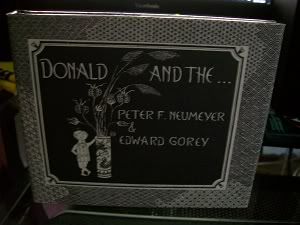
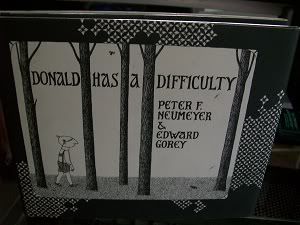
Already showing signs of fatigue, I'm going to review these two awesome books by author Peter F Neumeyer and illustrator Edward Gorey together, because they're both part of the three childrens books Neumeyer and Gorey created together (The third, Why We Have Day and Night is apparently out of print and hard to get a hold of). Luckily these two are still in print, here's Donald Has A Difficulty and Donald And The....
I had been meaning to actually pick up some books illustrated by Edward Gorey for a long time, and after seeing these in a discount book store with a friend I really had no reason not to snatch them up. The good news, I love them. The bad, this means I'll probably be tracking down more of his books (including Why We Have Day and Night) and crying as they empty my poor bank account.
Donald Has A Difficulty tells the tale of poor Donald as he deals with a splinter, and the painful process of removing it and sterilizing the wound. However, it's written in a way that the entire story is slightly off putting, never sure what will become of poor Donald on the next pages. Meanwhile, Donald And The..., my personal favourite, sees Donald and his mother taking a worm of some sort out of a garbage can and observing as Donald watches it transform first into a cocoon and then finally a....well, I won't spoil that bit for you.
In both cases, not only is Gorey's illustration outstanding in an eerie way but it's also clear that much of the reason these books are so enjoyable is due to the great way that the writing and illustrations compliment each other. I look forward to reading some of Gorey's work in which he serves as both writer and illustrator. Apparently it gets weird, and I like weird.
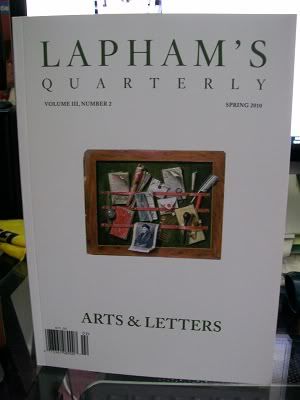
Taking a total shift, this is the second issue of the third volume of Lapham's Quarterly, a magazine by former Harper's editor Lewis H. Lapham. The series functions by having each issue based around a central theme (In this case, Arts & Letters) and supporting it with what can only be described as as whole ton of contributions not only by historical figures, but also by contemporary figures. To put it into perspective, the back cover boasts that some of the contributors to this issue alone are "Van Gogh, Barrett-Browning, Wagner, Vonnegut, Suetonius, Warhol, Armstrong, James, Juvenal, Horave, Bolano, Hamsun, Pushkin, Rushdie and Steiner". With a span of over 2000 years behind the contributions, that's alot to work with.
At first I was impressed by the idea, and then as I started becoming weary about how well it would flow together. However, in the end I was incredibly impressed by how it all came together. This is a great read for anyone with an interest in assorted facts (as I am), or in history (as I am). Also, this issue in particular is great in the sense that it often puts each individual's creative processes into a really concise chunk of text, and as you read you'll get great insights into the lives of everyone from Plato to Hitler, with short letters or correspondences that are often overlooked in favor of their more important work. A great magazine that still feels less like a magazine and more like a book that could stand on its own two feet.
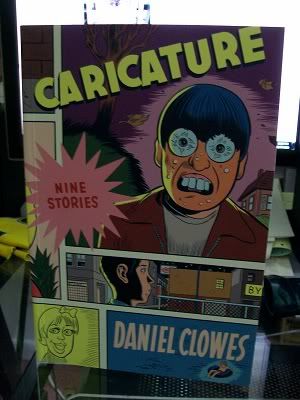
Back to graphic novel-dom with Caricature, a collection of nine short stories by award winning Daniel Clowes. I'll just put out there that I don't think Daniel Clowes has the capability of creating anything that I won't enjoy, so if you're waiting for me to say something bad about this collection, keep on walkin. All but one of these stories (the exception being Green Eyeliner) were originally published in his comic book series Eightball, which is also known for Ghost World, Like A Velvet Glove Cast In Iron, among even more outstanding titles.
All of the stories generally deal with some sort of societal deviance with a strong sense of naturalism as Clowes focuses of the day-to-day often mundane lives of his otherwise eccentric group of characters. With stories covering everything from the mental decline of a caricature artist, to a loner kid forced to live with his grandparents, and even stories involving a gynecologist and a superhero, there is no shortage of suspense, shocks, or entertainment provided in only 101 pages. Of course, it also doesn't hurt that Clowes is also an entirely stellar artist.
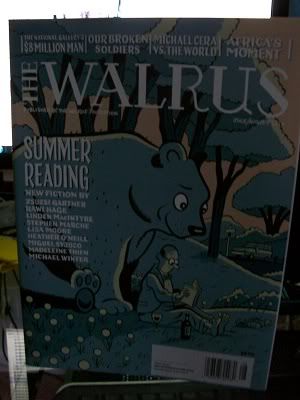
I read a list of recommended Canadian Magazines that I thought that I should be checking out, and The Walrus was one of them, and I jumped in head first at Vol.7 No.6. Before I begin, I'm going to get some comic nerdery out of the way, the cover and many illustrations throughout were done by the amazing Guelph, Ontario artist Seth. Furthermore, many of the other illustrations in this issue were by Ginette Lapalme, a member of the Toronto, Ontario comic collective Wowee Zonk. It's great to see this sort of thing popping up in places like this!
Anyway, now that I've taken care of that I'll get into how much the rest of this magazine rules. Firstly, it's got that perfect Magazine length that I mentioned in another post, with the page count sitting at 81 including ads, The Walrus features 13 pieces ranging from a critique of the Canadian critical culture (something I'm not very knowledgeable about, but was interesting anyway) to a story of how Ghana managed to claw its way out of post-colonial struggles, surpassing most of the continent. This span of so many different subjects in what is really a relatively short amount of spaces makes for exactly what a magazine should be, low on the quantity scale by sky high when it comes to quality. This was good enough that I am actually temped to subscribe, rather than picking it up at my local bookstore, and that thought rarely if ever crosses my mind for most magazines.
As a sidenote, there is also an excellent group of Canadian-penned short stories included which I probably would have considered picking up even if it had been in no way related to this magazine, great stuff.

From a magazine that I can't wait to read more of, to a magazine that I doubt I'll be picking up anytime soon, it's time for. Utne Reader. This issue piqued my attention because of the "72 Award-Winning Magazine You Will Love" line across the top of the cover, so I figured "why not" and picked it up. While I do have to give it credit for introducing me to both The Walrus and Geist (see next review), that's pretty much where my praise ends.
Utne works by harvesting articles from all sorts of magazines (12,000 publications, to be exact) and cherry picking what they see as the best articles to include in each bi-monthly issue. While I like the idea of what they're doing, it doesn't work out so well. The articles themselves aren't bad, but the way they cram so many (20 articles plus dispatches into 96 pages) makes it feel almost laborious to read through, and in the case of the great articles (in this case, the cover article about the realatively boring day-to-day events of a couple Al-Qaeda which showed them cooking eggs, for example.) I'd rather just read that in the original magazine, maybe I'm just a magazine puritan or something.
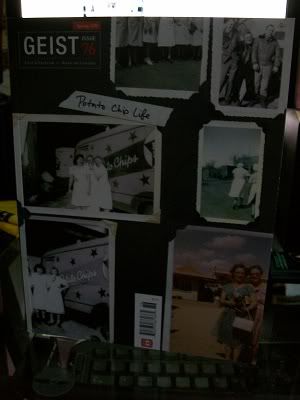
Praise Jah that reading Utne eventually lead me to Geist, an amazing Canadian collection of primarily fiction, but also some short non-fiction pieces as well. Not to mention that it is laid out amazingly, with minimal pictures (mainly black and white) with real simple line breaks dividing pieces.
Personal favourite articles included Memory Arranger, which tells the story of Faith Moosang finding a photo album of women who used to work at a potato chip factory years ago (during WWII) and piecing together a history of sorts around them. Sound good? well, remember that it's a non-fiction piece as well and it gets even better. Also, Bruce McDougal's Talent Night the terribly depressing story of a father son relationship, I'd explain more but the surprise is what makes the story.
Another great Canadian magazine full of equally great Canadian content, I'll be sure to keep up with this one as well.
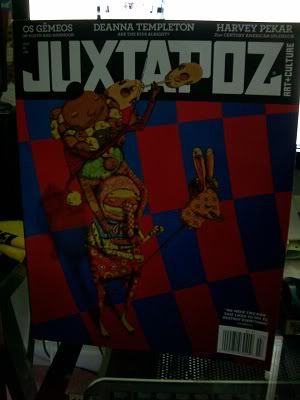
Coming into the final stretch of this reviewathon, it's time for my first issue of "Art+ Culture" magazine Juxtapoz with issue no. 113.
I had always looked at this magazine a little apprehensively, because to be honest I thought it would either be a little too much over my head in terms of content or it would just be stuff I thought I might find to be a little lame. I'm glad I was wrong on both accounts. Primarily image based (as a magazine like this should be), I quickly found my self unable to put this down, I was reading it on break at work and "accidentally" forgot to finish break on time, whoops. I can't think of anything I didn't really enjoy about this magazine, and I was really excited as I made my way through the interviews (Especially with the duo Os Gemeos, computer wizard Robert Hodgin and former Vancouverite Richard Hambleton) and as soon as I finished each piece I would rush to the barren wastes of the internet to try and scrounge up whatever extra info I could find.
I'm probably so excited because I'm diving into an area in which I have very little experience with and I love being surrounded by things that are so new and alien to me. Maybe that feeling will wear away with future issues, but I hope not.
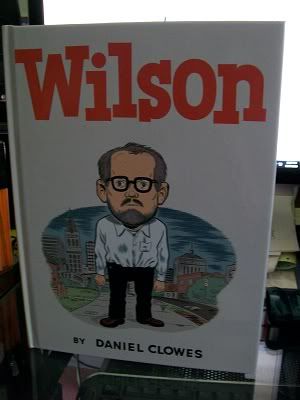
The final graphic novel of this set of books (I PROMISE!) and I'm coming back to Daniel Clowes again with his most recent book, Wilson. With this novel it's easy to see Clowes absolutely perfecting the sort of character based story he was becoming more comfortable with in the stories of Caricature. According to the back cover, Wilson is "A big-hearted slob, a lonesome bachelor, a devoted father and husband, an idiot, a sociopath, a delusional blowhard, a delicate flower and 100% Wilsonesque". I don't think I can sum it up any better than that.
Part heart breaking but mainly embarrassing, Wilson is in panic mode as he tries to scrape his life back together, including a long lost daughter, an ex-wife and a dog. What this turns into can't be described here, you'll just have to pick this up and read it yourself. I feel like this is what might happen if Milton of Office Space fame grew a pair and became a sociopath in comic form, and we all know he's the best part of that movie.
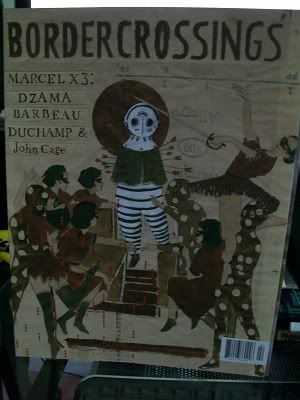
I was doing some birthday shopping for a friend when I noticed this magazine sitting on the magazine rack across the room. I had known how interested she was in at least two of the Marcel triplets mentioned on the cover (Dzama and Duchamp, I'm not sure about Barbeau) and after looking at it for a while I had decided to pick up two copies, one as part of said gift and one for myself. I mean, what's not to like? aritcles that seemed great at a quick glance, great images and another magazine published in Canada. Bordercrossings Vol.29 Issue 2 was a win/win/win/win/win situation.
My instinct didn't fail me, and as I mentioned with Juxtapoz, I was totally enamored with the idea of reading about something that I had no real knowledge about and learning so much from just over 100 pages. However, while I learned that Juxtapoz was primarily image based with less emphasis on the theoretical half of art, Bordercrossings sits in the middle, having a happy balance of the two. I was pleased with this because despite some parts seeming a little bit dense (it took me a couple reads of some articles to grasp them, I'll admit it) I doubt I would have enjoyed this as much had it not been slightly challenging.
Perhaps the highlight of reading it was the piece with/about Quebec artist Marcel Barbeau, and more specifically the fact that it opened my eyes to Le Refus Global, an organization that was not only controversial and important, but also distinctly Canadian. I can't believe that I had never heard about this before, especially considering the major role in played in Quebec society and French Canadian relations.
I feel like I could keep going and listing all of the awesome things that this single magazine opened my eyes to, but I'll stop and leave it at the fact that if you pick this up, you WILL be impressed, you WILL learn something and you WILL be a better person because of it. $9.95 is a small price to pay for that.
I can't believe I just wrote all that in two days time, next time I need to balance my reading/reviewing out more evenly, goddamn.

No comments:
Post a Comment